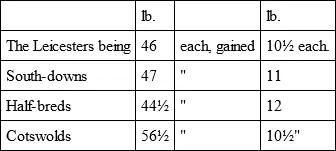Various - Blackwood's Edinburgh Magazine, No. 401, March 1849
Здесь есть возможность читать онлайн «Various - Blackwood's Edinburgh Magazine, No. 401, March 1849» — ознакомительный отрывок электронной книги совершенно бесплатно, а после прочтения отрывка купить полную версию. В некоторых случаях можно слушать аудио, скачать через торрент в формате fb2 и присутствует краткое содержание. Издательство: Иностранный паблик, Жанр: periodic, foreign_edu, Путешествия и география, на английском языке. Описание произведения, (предисловие) а так же отзывы посетителей доступны на портале библиотеки ЛибКат.
- Название:Blackwood's Edinburgh Magazine, No. 401, March 1849
- Автор:
- Издательство:Иностранный паблик
- Жанр:
- Год:неизвестен
- ISBN:нет данных
- Рейтинг книги:4 / 5. Голосов: 1
-
Избранное:Добавить в избранное
- Отзывы:
-
Ваша оценка:
- 80
- 1
- 2
- 3
- 4
- 5
Blackwood's Edinburgh Magazine, No. 401, March 1849: краткое содержание, описание и аннотация
Предлагаем к чтению аннотацию, описание, краткое содержание или предисловие (зависит от того, что написал сам автор книги «Blackwood's Edinburgh Magazine, No. 401, March 1849»). Если вы не нашли необходимую информацию о книге — напишите в комментариях, мы постараемся отыскать её.
Blackwood's Edinburgh Magazine, No. 401, March 1849 — читать онлайн ознакомительный отрывок
Ниже представлен текст книги, разбитый по страницам. Система сохранения места последней прочитанной страницы, позволяет с удобством читать онлайн бесплатно книгу «Blackwood's Edinburgh Magazine, No. 401, March 1849», без необходимости каждый раз заново искать на чём Вы остановились. Поставьте закладку, и сможете в любой момент перейти на страницу, на которой закончили чтение.
Интервал:
Закладка:
The subject of sheep and cattle feeding is very important, and very interesting, and our book is rich in materials which would provoke us to discuss it at some length, did our limits admit of it. We must be content, however, with a few desultory extracts.
The following, in regard to sheep feeding upon turnips, is curious, and, in our opinion, requires repetition: —
"A curious and unexpected result was brought to light by Mr Pawlett, and is thus related in his own words, – 'Being aware that it was the custom of some sheep-breeders to wash the food, – such as turnips, carrots, and other roots, – for their sheep, I was induced also to try the system; and as I usually act cautiously in adopting any new scheme, generally bringing it down to the true standard of experience, I selected for the trial two lots of lambs. One lot was fed, in the usual manner, on carrots and swedes unwashed ; the other lot was fed exactly on the same kinds of food, but the carrots and swedes were washed very clean every day: they were weighed before trial, on the 2d December, and again on the 30th December, 1835. The lambs fed with the unwashed food gained each 7½ lb., and those on the washed gained 4¾ lb. each; which shows that those lambs which were fed in the usual way, without having their food washed, gained the most weight in a month by 2¾ lb. each lamb. There appears to me no advantage in this method of management – indeed animals are fond of licking the earth, particularly if fresh turned up; and a little of it taken into the stomach with the food must be conducive to their health, or nature would not lead them to take it.'"
Another experiment on the fattening properties of different breeds of sheep, under similar treatment, quoted from the Journal of the Royal Agricultural Society of England , is also deserving the attention of our readers: —
"Experiments were made in 1844-5 on the Earl of Radnor's farm at Coleshill, on the comparative fattening properties of different breeds of sheep under the same treatment. The sheep consisted of Leicesters, South-downs, half-breds, – a cross between the Cotswold and South-down – and Cotswolds. The sheep, being then lambs, were divided into lots of three each of each breed, and were grazed four months, from 29th August 1844 to 4th January 1845, when they were put on hay and swedes for three months, from 4th January to the 31st of March following. While on grass, the different breeds gained in weight as follows: —

It is one of the most delicate qualifications connected with the stock-feeder's art to be able to select that stock, and that variety of it, which, under all the circumstances in which he is placed, will give him the largest return in money – hence every experiment like the above, if well conducted, is deserving of his close attention. At the same time, in rural experiments, more almost than in any other, the number of elements which interfere with the result, and may modify it, is so great, that too much confidence ought not to be placed upon single trials. Repeated results of one kind must be obtained, before a farmer can be justified in spending much money on the faith of them.
In turning to the winter feeding of cattle upon turnips and other food – a subject important enough to justify Mr Stephens in devoting forty of his closely printed pages to it – we are reminded of a character of this book which we like very much, which squares admirably with our own idea of neatness, order, and method, and which we heartily commend to the attention of our farming friends: this is the full and minute description he gives of the duties of every class of servants upon the farm, of the necessity of having these duties regularly and methodically performed, and of the way in which the master may bring this about.
The cattle-man is an important person in the winter feeding of cattle; he therefore commences this section with an account of the duties and conduct of this man. Even his dress he describes; and the following paragraph shows his reason for drawing the young farmer's attention to it: —
"The dress of a cattle-man is worth attending to, as regards its appropriateness for his business. Having so much straw to carry on his back, a bonnet or round-crowned hat is the most convenient head-dress for him; but what is of more importance when he has charge of a bull, is to have his clothes of a sober hue, free of gaudy or strongly-contrasted colours, especially red , as that colour is peculiarly offensive to bulls. It is with red cloth and flags that the bulls in Spain are irritated to action at their celebrated bull-fights. Instances are in my remembrance of bulls turning upon their keepers, not because they were habited in red, but from some strongly contrasted bright colours. It was stated that the keeper of the celebrated bull Sirius, belonging to the late Mr Robertson of Ladykirk, wore a red nightcap on the day the bull attacked and killed him. On walking with a lady across a field, my own bull – the one represented in the plate of the Short-horn Bull, than which a more gentle and generous creature of his kind never existed – made towards us in an excited state; and for his excitement I could ascribe no other cause than the red shawl worn by the lady, for as soon as we left the field he resumed his wonted quietness. I observed him excited, on another occasion, in his hammel, when the cattle-man – an aged man, who had taken charge of him for years – attended him one Sunday forenoon in a new red nightcap, instead of his usual black hat. Be the cause of the disquietude in the animal what it may, it is prudential in a cattle -man to be habited in a sober suit of clothes."
Then, after insisting upon regularity of time in everything he does, following the man through a whole day's work, describing all his operations, and giving figures of all his tools, – his graip, his shovel, his different turnip choppers, his turnip-slicer, his wheel-barrow, his chaff-cutters, his linseed bruisers, and his corn-crushers, – he gives us the following illustration of the necessity of regularity and method, and of the way to secure them: —
"In thus minutely detailing the duties of the cattle-man, my object has been to show you rather how the turnips and fodder should be distributed relatively than absolutely; but whatever hour and minute the cattle-man finds, from experience, he can devote to each portion of his work, you should see that he performs the same operation at the same time every day . By paying strict attention to time, the cattle will be ready for and expect their wonted meals at the appointed times, and will not complain until they arrive. Complaints from his stock should be distressing to every farmer's ears, for he may be assured they will not complain until they feel hunger; and if allowed to hunger they will not only lose condition, but render themselves, by discontent, less capable of acquiring it when the food happens to be fully given. Wherever you hear lowings from cattle, you may safely conclude that matters are conducted there in an irregular manner. The cattle-man's rule is a simple one, and easily remembered, — Give food and fodder to cattle at fixed times, and dispense them in a fixed routine . I had a striking instance of the bad effects of irregular attention to cattle. An old staid labourer was appointed to take charge of cattle, and was quite able and willing to undertake the task. He got his own way at first, as I had observed many labouring men display great ingenuity in arranging their work. Lowings were soon heard from the stock in all quarters, both in and out of doors, which intimated the want of regularity in the cattle-man; whilst the poor creature himself was constantly in a state of bustle and uneasiness. To put an end to this disorderly state of things, I apportioned his entire day's work by his own watch; and on implicitly following the plan, he not only soon satisfied the wants of every animal committed to his charge, but had abundant leisure to lend a hand to anything that required his temporary assistance. His old heart overflowed with gratitude when he found the way of making all his creatures happy; and his kindness to them was so undeviating, they would have done whatever he liked."
Читать дальшеИнтервал:
Закладка:
Похожие книги на «Blackwood's Edinburgh Magazine, No. 401, March 1849»
Представляем Вашему вниманию похожие книги на «Blackwood's Edinburgh Magazine, No. 401, March 1849» списком для выбора. Мы отобрали схожую по названию и смыслу литературу в надежде предоставить читателям больше вариантов отыскать новые, интересные, ещё непрочитанные произведения.
Обсуждение, отзывы о книге «Blackwood's Edinburgh Magazine, No. 401, March 1849» и просто собственные мнения читателей. Оставьте ваши комментарии, напишите, что Вы думаете о произведении, его смысле или главных героях. Укажите что конкретно понравилось, а что нет, и почему Вы так считаете.












